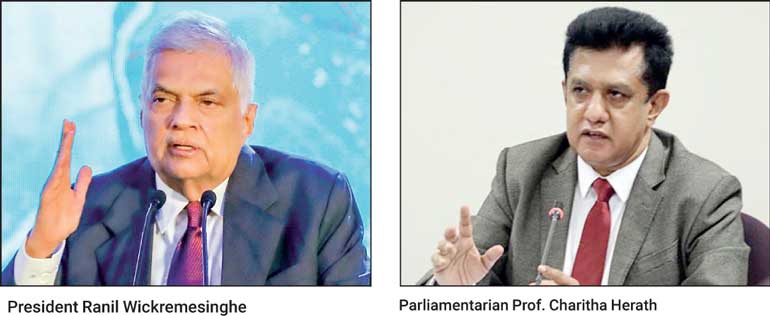Monday Mar 02, 2026
Monday Mar 02, 2026
Wednesday, 7 February 2024 00:46 - - {{hitsCtrl.values.hits}}

In a letter addressed to President Ranil Wickremesinghe, Parliamentarian Prof. Charitha Herath has expressed apprehensions regarding the evident conflict between the executive and legislative branches, notably highlighted by the dispute over appointing a new Supreme Court judge in place of Justice Buwaneka Aluwihare.
In this letter, he has highlighted to the President the concerns regarding potential constitutional issues arising out of such a conflict, despite not being a member of the Constitutional Council.
Herath highlighted the President’s suggestion to appoint the current Appeal Court President, Nissanka Bandula Karunaratne, as a replacement for Aluwihare, which was met with rejection from the Constitutional Council, revealing a clear constitutional issue.
The MP noted the President’s recent remarks criticising the Council, suggesting that he believes it is the Council’s sole responsibility to approve all proposals presented by the President without any further action.
The MP said the President’s statement, “The Constitutional Council, chaired by the Honourable Speaker of the Parliament and established under the Constitution, has been vested with the authority to aid the President in specific decision-making processes and is regarded as part of the executive,” has led to a grave constitutional crisis in the country.
Commenting on the President’s views, Herath said the President’s opinion of the council is marginalised and one-dimensional. He also observed that Wickremesinghe’s perspectives are not aligned with the principal expectations outlined in the 17th Amendment to the Constitution concerning the Constitutional Council. “Your position appears to be limited and biased,” the MP said.
He also noted that the Supreme Court in deciding a case once determined that the Constitution did not intend the President to function as an unfettered repository of executive power unconstrained by the other organs of Government.
Herath also criticised the President’s stance, pointing out that the Constitutional Council, according to the President, does not reflect the views of the legislature but was established to assist the executive in its functions. The MP remarked that considering the Supreme Court’s interpretation of provisions related to the Constitutional Council, it is perplexing how the President arrived at such an assumption.
“The interpretations provided by the Supreme Court regarding the 18th, 19th, 20th, and 21st constitutional amendments since the 17th constitutional amendment raise serious questions about how you arrived at your stance on the Constitutional Council,” the MP noted.
“Your assertion that the Constitutional Council is an integral part of the executive is inaccurate,” Herath said. In conclusion, Herath emphasised that both the Parliament and the Executive President are accountable to the people according to the constitution and this principle also extends to a Caretaker President, underscoring the importance of accountability and adherence to constitutional principles.